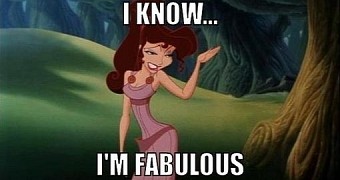Two major stories went viral this week, both being considered empowering messages to regular women, aimed to shift perceptions on the female body, and idealized notions of beauty and impossible bodily “perfection.”
One was a campaign from plus-sized retailer Lane Bryant called #ImNoAngel, the other one was Rumer Willis’ on-camera admission (on Dancing With the Stars) that she’d been (cyber)bullied growing up because of her looks.
Both weren’t what you thought they were.
#ImNoAngel and Rumer’s empowering message
First things first: let’s talk a bit about these two stories, in case you missed them when they came out. For the record, I think body diversity is lacking in the entertainment industry and that the move towards the inclusion of more shapes is long-needed. It’s admirable too, to a certain extent.
Personally speaking, I think a model who’s a size 22, like Tess Holliday, is probably doing more harm to the women she wants to inspire than good, because, no matter how beautiful or confident she feels (and she has every right to feel all these things), she is overweight.
The world is facing a serious obesity problem, so perhaps the last thing we need is to glorify people who are just that. Because models like Tess aren’t just models, who represent a large segment of the paying customer market by showcasing plus-size clothes: they are now hailed as role models and heroes. Therein lies the problem.
#ImNoAngel is Bryant’s (unofficial) response to Victoria’s Secret famous Angels, a group of famous plus-size girls who are now modeling the company’s latest collection. The campaign tells regular women that beauty comes in all shapes and sizes, but particularly in larger sizes, because that’s where the models are situated at.
It also encourages ladies from all over the world to send in their photos and messages of empowerment under this hashtag on social media. So far, so good.
Rumer’s story proved to strike a chord with DWTS audiences: she is the daughter of Bruce Willis and Demi Moore, but inherited her father’s strong jaw, prominent chin and masculine facial features. Because of it, she was called a lot of things growing up in the media, mostly Buttaface and Potato Head, and it chipped away at her confidence and sense of worth.
I’m sure that’s a story most of us can relate to, even if we haven’t had Rumer’s exposure in the media. Kids can be very cruel and even the smallest perceived flaw in another becomes for them the topic of a very cruel joke.
A message isn’t as noble as it seems if the source is perverted
While at first sight there is nothing wrong with these two instances of empowering female messages, you might reconsider if you look closely.
We’ll ignore the fact that Lane Bryant is selling a product and that this “empowering” campaign is nothing but a marketing campaign disguised in feminist robes. Dove has been doing it for a very long time, and it’s a recipe proven for success.
What I find that perverts the message within the campaign is the amount of Photoshop used for it. This applies to all those “fabulous” and “empowering” spreads with plus-size models: while they claim to speak to the average woman, the one who doesn’t fit into a size 0 or 4 dress like catwalk girls do, the one who has rolls on her tummy and actual hips, the one whose thighs touch, they don’t represent a reality.
Just like size 0 girls in magazines and fashion ads don’t reflect a reality, these plus-size girls, as gorgeous as they might be, are not real either. Sure, you can still see some rolls on them and you can see that they’re curvier than the other models, but everything else about them is Photoshopped into a smoothness that I find irritating. Particularly so when it presents itself as reality.
As for Rumer, her message comes at a very convenient time, because she’s trying to win public votes to stay in a TV competition. Dancing alone will secure her many of those, but if she wants to win, she has to deliver good sob-stories as well.
Secondly, she’s being a hypocrite.
“For years I thought ‘Maybe I can get plastic surgery. If I change my face or get really skinny, that will be it, that will be the answer’ and it’s not,” she says. The answer is finding the strength and the confidence within, and brushing off haters as stupid noise that needs to be blocked out - like she did.
Again, this sounds like a most noble and admirable thing to say, but the reality is that Rumer did get plastic surgery, much like her famous mother. She had her chin shaved down, and her lips plumped with filler and she got new teeth right before she started on DWTS, but she still claims to be relatable to women.
In reality, most of these women she speaks to would probably not afford this kind of expense.
The bottom line: the message is good but the messenger can go
What I’m trying to say is not that we don’t need these kind of messages in our life, but rather that we should exercise some caution before putting the messengers on a pedestal and vouching they’re our newfound role models or heroes.
We do need body diversity in showbiz, and we do need more awareness on bullying in cyber-space and a change in the way the female body is perceived / appraised. We do need better representation in the media and to remove old and impossible ideals of beauty from it.
Nonetheless, the way to getting all this done shouldn’t be paved with Photoshop and plastic surgery lies, spread liberally by opportunists. We need to learn to make a difference between these and real empowering messages.

 14 DAY TRIAL //
14 DAY TRIAL //